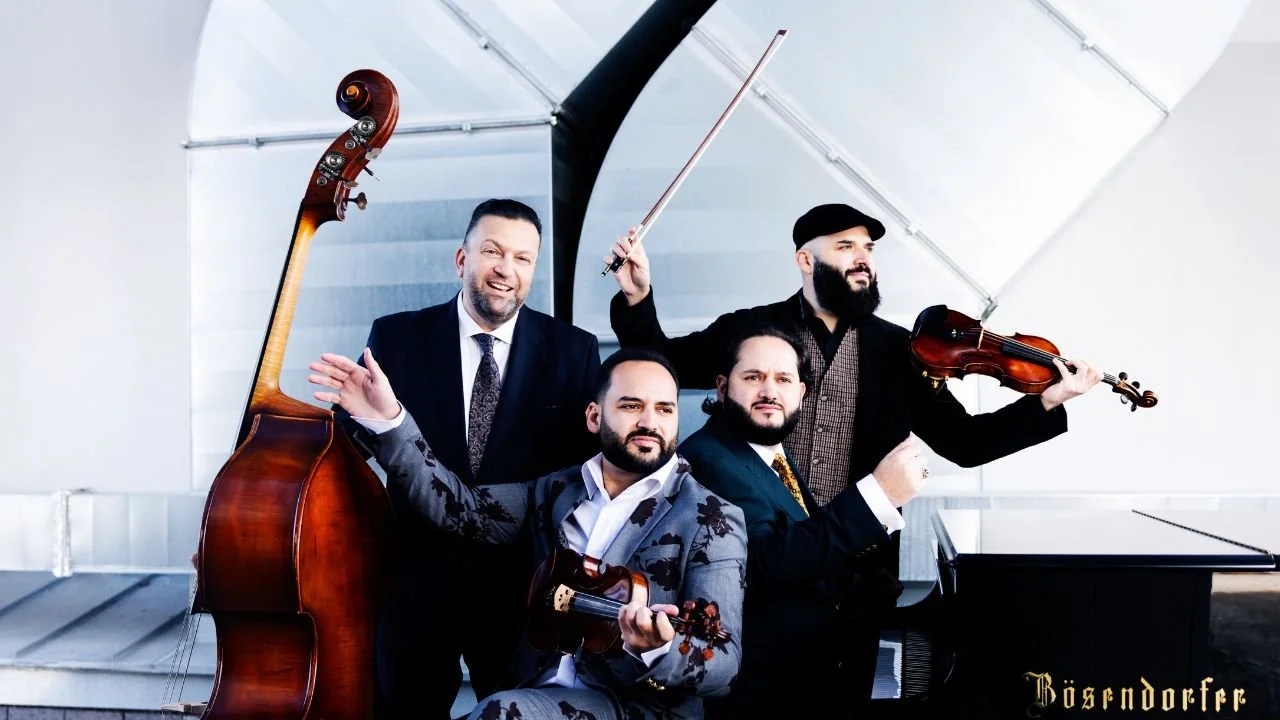The Janoska Ensemble is – in pop jargon – a “live band”.
The emotional intelligence and subtle humor of
the artists’ interaction with their audience, combined with their masterfully staged play on familiar
melodies and surprise effects in their newly created musical numbers, can be relied upon to stir listeners
from their seats, almost invariably resulting in enthusiastic standing ovations. Their Janoska Style, their
never merely superficial virtuosity, and their ability to engage with one another and their audience in
quick-fire musical dialogue have brought invitations from big-name stage personalities such as Anna
Netrebko, Al Jarreau, Bobby McFerrin, Juan Diego Flórez, Brian McKnight, Julian Rachlin, Randy
Newman, Biréli Lagrène, and Lalo Schifrin.
“The Janoska Ensemble is one of the most original groups of extremely talented musicians, who are very unique in performing classical music, jazz, Latin, and other genres. Their inspiration is inexhaustible, and they deserve everyone’s attention and enthusiasm.”
Lalo Schifrin, Hollywood composer
Despite their full calendar of engagements and tours, the Janoska Ensemble transmits an inexhaustible
passion for making music. The four musicians are constantly working on new programs and projects.
Their unique “Janoska Style” forms the basis for all that is yet to come, representing the seal of approval
for one of the most thrilling and universal music ensembles of the present day.
Janoska style: each musical number is unique, born from the magic of the moment.
It takes more than one sentence to describe what exactly constitutes the Janoska style – simply listing
all its biographical and artistic ingredients would take too long and wouldn't do it justice. But what is it
exactly? Classical works in new arrangements, influences that extend into today's music! One key
element is the lost art of improvisation, especially based on classical music. The Janoska Ensemble
creates new, never-before-heard synergies, bridges between the original and its modern interpretation
paired with a fusion of improvisation and creativity: in short, the Janoska style.
“I was very impressed upon discovering the Janoska Ensemble with their unique sound combined with extremely high-quality virtuosic playing. Their exciting interpretations and creative arrangements in their own very individual style produce a very innovative and refreshing new approach to music-making.I wish them the great success that they deserve!”
Mischa Maisky, cellist
The four members of the Janoska Ensemble completely fulfil all the criteria of the “Janoska Style”: A solid
classical education, decades of playing practice from childhood, a deeply rooted musical tradition, the
highest level of technical perfection, and a deep joy of playing and performing, including the art of free
improvisation. All this makes the ensemble more than the sum of its parts; rather, it is a perfectly well-
balanced musical family of sorts. The man on the double bass, Julius Darvas, doubles as the program’s
MC. He describes the “Janoska effect”, as he calls the interaction during a concert, as follows: “The mood
of the audience has a direct effect on our enthusiasm for playing, especially when it comes to
improvisation: We give - we receive - we give more - we receive more... and it goes on and on. Then the
energy begins to circulate properly in the concert hall!"
“As an ensemble they are a whiff of fresh air, combining their outstanding, individual talents with their family ties. They have become successful in performing in a variety of genres in their unique ‘Janoska style’, which is creating a new hybrid genre.”
Julian Rachlin, violinist
The Janoska Ensemble is also in a kind of continuous "improvisation mission" in terms of workshops and
master classes: This teaching activity led the four musicians, among others to the Kronberg Academy or
to the Menuhin Festival in Gstaad. The reactions of the course participants were euphoric throughout:
The collaboration with the Janoska Ensemble – so their general opinion - gave them much more
confidence to improvise freely in the classic context.

